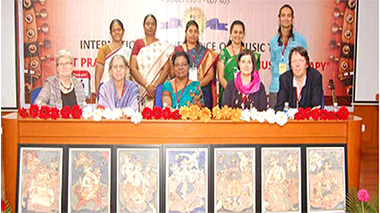3rd International Conference on Music Therapy 16.02.2016
The Conference was inaugurated by Prof. Suzanne Hanser, Chair, Berklee College of Music, Massachusetts, Boston, USA online and her inaugural address focused on opportunities offered through this conference to the participants to understand how western science and eastern traditions, ragas and mantras can come together to provide more effective music therapy services and that even modern medicine in the West is waking up to what we, in India have since Vedic Traditions and integrate ancient wisdom, contemplative traditions, and spirituality into medical services and healthcare. The Conference Proceedings was released by the Vice Chancellor Prof. KR Sethuraman and the official bulletin “The Harmony” for the first quarter of the year 2016 was released by the Dean, Research and PG Studies and Allied Health Sciences, Prof. N Ananthakrishnan, Prof. KR Sethuraman, Prof. N Ananthakrishnan and Prof. M Ravishankar, Dean of Faculty of Medicine delivered their felicitations. Dr. Jorg Fachner, Professor, Music, Health and the Brain, Anglia Ruskin University, Cambridge, Prof. Gene Ann Behrens, Director of Music Therapy Program, Elizabethtown College, Pennsylvania, US, Dr. Anna Bokowska, University of Physical Sciences, Krakow, Poland, Dr. Tsivia Horesh from Israel, were the other overseas speakers apart from Dr. Sumathy Sundar, Director who also spoke on behalf of SBV on the current research activities on music therapy from SBV. Dr. Jorg Fachner, in his keynote address on Music Therapy and Biomarkers on Depression treatment, talked about how can we document change as a function of doing music in a therapeutic setting and how it works. He elaborated on how biomarkers representing the effectiveness and those representing the music therapy process are related to an accumulation of and a focus on important moments in therapy time. That, analyzing resting state EEG may inform about group effects, while moments of interest in the improvisational process may reveal synchronization of brain processes. The promises of biomarkers and neurometrics for music therapy were discussed to understand where and why the change in therapy occurs. The delegates learnt the promises of biomarkers and neurometrics for music therapy drawn from the results of depression research, on recent work with wireless EEGs and improvisation, music performance, neuro-feedback and game applications in psychiatric and neuro-rehabilitation.
 3rd International Conference on Music Therapy 16.02.2016
Proceedings of 3rd International Conference on Music Therapy
]]>
3rd International Conference on Music Therapy 16.02.2016
Proceedings of 3rd International Conference on Music Therapy
]]>


